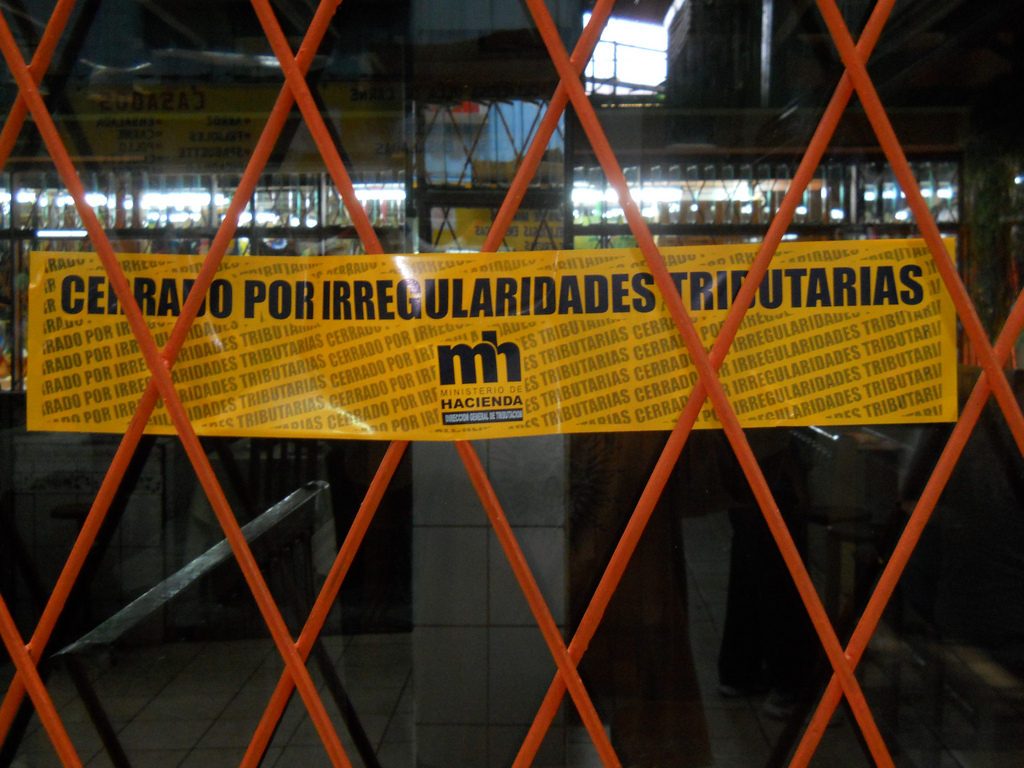
Photo by JHochstat, under Creative Commons license via flickr.com
In this post we’ll try to address a question which comes up again and again in teachers’ forums and group pages in Spain. The situation goes something like this: I work for an academy but a company has offered me the chance to do an in-company class/ translation. The trouble is, I need to bill them. As I’m not freelance, how can I do this? I don’t want to become a freelancer because I want to keep my contract and I don’t want to pay all that social security …
Unfortunately, there is no easy solution to this question – though this would not appear to be the case when one views some of the responses posted on the forums. “It’s easy, and you don’t even have to pay tax!” … “Up to €3000 and anyone can bill a company!” … “A mate of mine once did this and didn’t get into trouble, so it must be legit!” … etc. Please be wary of such quick-fix solutions, however well-intentioned. You may well get away with it, as others have done in the past, but you should be aware of the fact that you are running the risk of incurring fines. The trick is to inform yourself as much as possible and make sure that your backside is covered. This post is an attempt to help you do just that.
The main problem is that it is not strictly legit for anyone who is not registered freelance (or autónomo) to bill a company for any amount. But the existence of a legal grey area, and the previous decisions of tribunals (i.e. jurisprudence), allow for two main ways of getting around this. The trouble is that these are not officially written down anywhere, which is to say, SLB cannot be held responsible for you getting into any trouble for following either of the steps below. Our final piece of advice – to become properly autónomo/a – is the only method that we can officially recommend.
Method 1 – The Receipt
Most companies will insist on a proper bill or “factura” for a course or translation. However, in some cases this is not necessary, and if you can persuade the company in question to accept a receipt, you may be able to avoid becoming officially freelance.
It’s all about categorising your work as “rendimiento de trabajo”, or work performance, rather than as “actividad económica” or economic activity with Hacienda. You can do this when:
- The work done is related to the work you normally do on a contract, for which you are paying social security. If you normally teach English in an academy, say, an in-company class, a teacher-training course or a translation for a specific business could be considered “rendimiento de trabajo”.
- You are not using your own means of production to do the job. In other words, the course you teach is following a pack of materials not produced by yourself and is not taking place in your own home, and you are not hiring anyone else to help you do the job. In the case of translations, you cede the rights of exploitation of the work translated to the company paying you.
- The company retains 21% IRPF (income tax) for you, and pays this to Hacienda for you via model 111 as rendimiento de trabajo (if they don’t, you and they could both incur fines).
- You declare these earnings as rendimiento de trabajo in your yearly tax declaration (declaración de la renta).
- Your earnings do not go over the limit of the minimum interprofessional wage in Spain, which currently stands at €645.30 a month, or €7743.60 a year (2014). However, some tribunals have found that the earnings should not exceed €3000 a year in total. So there’s a grey area within a grey area …
- The work done is sporadic in nature. If it is seen to be regular, it may be regarded as economic activity, and failure to register it as such would be regarded as an infraction and fined. Unfortunately there is no clarity as to what would be considered sporadic, and what regular work, by a tribunal. However, earning the same amount for many consecutive months will obviously look more regular than the occasional job done for varying amounts.
If you can satisfy these six points, and convince the company concerned that they don’t need a proper bill, then you should be OK. One point – IVA is never included in such deals, and there is never a proper contract. See this blog post for an example of the receipt you’d have to use.
Method 2 – The “half a freelancer” method
This method is going to be necessary if the work done does not meet the requirements of method 1, or the company in question refuses to work with anything other than a bill. It essentially involves registering as a freelancer with Hacienda, but NOT with social security. In other words, you get to issue bills while avoiding the social security payments. Again, it assumes that you are already paying social security via a regular contract and that the work you are doing is not your main economic activity.
So, you can issue bills without paying freelance social security when:
- You have registered your economic activity with Hacienda for as long as you need to do it, via model 036 or 037 – see the epigraph relating to I.A.E., or impuesto de actividades económicas (tax on economic activities). In other words, you are a freelancer in the eyes of Hacienda if not in the eyes of Social Security. Thankfully, the two don’t seem to talk to each other much.
- You make the requisite declarations to Hacienda. If you need to include IVA (sales tax) on your bill – in most teaching and translation work you don’t, but there are exceptions to this – this means three-monthly IVA declarations (and registering in the IVA part of the aforementioned models). If not, you may be able to get away with a yearly IRPF declaration – assuming that 70% of the monies billed for have taxes deducted at source by the company. If not, there are three-monthly IRPF declarations. And fines if you don’t submit these.
- Although new freelancers can limit themselves to 9% IRPF for the first three years, we have seen legal advice suggesting that in the “half a freelancer” case, 21% IRPF should be paid to be on the safe side. As you are technically not a full freelancer, caution on this point is advised. It is not possible to decide on an intermediate figure, e.g. 15%.
- As with method 1, the work billed must not exceed €645.30 a month, or €7743.60 a year (2014). Apparently the idea that €3000 is the limit is a myth, but it is true that billing over €3000 to any company obliges that company to register your details with Hacienda. In other words, billing more than €3000 a year with this method simply makes you more visible to Hacienda.
- Again, like method 1, the work done must be seen as sporadic and not your main activity. If it can be construed as otherwise, you will be regarded as having failed to register yourself as a full freelancer with social security and fined accordingly. Once more, the definition of what constitutes regular or sporadic would be interpreted by a tribunal.
See this blog (in Spanish) for more details on some of these points.
Seems complicated? Our cooperative can help …
As a non-autónomo member of our cooperative, or soci col·laborador, not only would you enjoy access to our services but we would also help you with the paperwork if you needed to bill via one of the above methods. However, bear in mind that we would insist that the work billed for remains within the limits described above. We are not a billing cooperative for non-freelancers and we suspect that some cooperatives advertising themselves as such are operating on shaky ground legally speaking.
If the freelance work you are doing is more regular than sporadic, we would encourage you to become fully freelance. The social security payments are restricted at the beginning of the activity, and you can retain your regular contract if you wish. You’ll have legal and financial advice from us to make sure you keep on top of the bureaucracy and an agency service to help you pursue more work.
In either case, get in touch with your needs and we’ll see what we can do for you. Or bite the bullet and apply to join our cooperative today!
Or simply post a comment below if you have any general queries about the above points. Have you ever used either of the above methods? Any experiences to share? Any pitfalls we haven’t mentioned?
Until next time – fins la pròxima!




[…] How do I Bill if I’m not freelance? […]